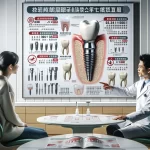In modern dentistry, titanium dental implants stand out as a highly effective solution for restoring missing teeth and achieving a natural-looking smile. Known for their durability and long-lasting properties, these implants offer a superior alternative to traditional dentures or bridges. Many individuals seeking a permanent tooth replacement option often wonder: How long do titanium dental implants last?
This guide explores the various factors that influence the lifespan of titanium dental implants. Key elements include:
- The advanced materials used in their construction
- The precision of surgical techniques
- Post-operative care and maintenance
Whether you’re contemplating titanium dental implants or simply curious about their durability, this article aims to provide you with essential insights to make informed decisions regarding your oral health.
Understanding Titanium Dental Implants

Before exploring the longevity of titanium dental implants, it is crucial to grasp their fundamental structure and composition. A dental implant comprises three primary components:
The Implant Post: This titanium screw-like component is surgically inserted into the jawbone, acting as an artificial tooth root.
The Abutment: Serving as a connector, the abutment links the implant post to the final restoration, which can be a crown, bridge, or denture.
The Restoration: This visible part of the implant is meticulously designed to replicate both the appearance and function of a natural tooth.
Titanium is favored for its biocompatibility and exceptional strength. Its unique property of fusing with surrounding bone tissue—a process known as osseointegration—creates a stable foundation for the implant. This seamless integration not only enhances stability but also significantly contributes to the longevity of titanium dental implants.
Typically, osseointegration takes about 3 to 4 months, during which time new bone tissue forms around the implant post. Additionally, advancements in surface treatments have been shown to improve osseointegration outcomes by enhancing the bond between titanium and bone tissue.
Overall, titanium implants boast a success rate exceeding 90%, making them one of the most reliable options for tooth replacement in modern dentistry.
Factors Influencing the Longevity of Titanium Dental Implants
Titanium dental implants are engineered for durability; however, their lifespan is influenced by several critical factors that patients must understand to maximize their effectiveness over time.

Quality of Materials
The longevity of an implant is significantly affected by the quality of materials used in its construction. High-grade titanium alloys are essential as they provide superior strength, corrosion resistance, and biocompatibility. Reputable manufacturers implement rigorous quality control measures to ensure each implant meets high durability standards. Studies indicate that with proper care, titanium implants can last between 20 to 30 years, and in some cases, even longer.
Surgical Technique
The expertise of dental professionals is paramount for successful implantation. Skilled dentists ensure accurate placement, angulation, and depth during surgery. Precise techniques reduce trauma to surrounding tissues, facilitating quicker healing and minimizing complications such as peri-implantitis that could jeopardize implant longevity.
Bone Density
Successful osseointegration requires adequate jawbone density and quality. Patients with conditions like osteoporosis may need additional procedures such as bone grafting to enhance their jawbone’s capacity to support implants effectively.
Oral Hygiene
Maintaining proper oral hygiene is crucial for prolonging implant life. Neglecting oral care can lead to plaque buildup and bacteria growth around implants, resulting in gum disease (peri-implantitis) and potential bone loss around implants. Regular brushing, flossing, and dental check-ups are vital for sustaining surrounding tissue health.
Lifestyle Choices
Lifestyle factors such as smoking can adversely affect healing processes and increase failure risks for implants. Moreover, excessive alcohol consumption or high sugar intake can lead to oral health issues that compromise implant stability over time. Adopting a healthy lifestyle can significantly enhance the longevity of dental implants.
Maximizing the Lifespan of Titanium Dental Implants

To ensure the longevity of titanium dental implants, several proactive measures can be taken alongside the important factors already discussed:
Choose a Reputable Dental Professional: Select an experienced and highly skilled implant dentist or oral surgeon specializing in dental implant procedures. Their expertise directly influences both the success and durability of your implants.
Maintain Excellent Oral Hygiene: Establish a rigorous oral hygiene routine that includes brushing twice daily with a soft-bristled toothbrush and low-abrasive toothpaste, flossing every day (using implant-specific floss if necessary), and rinsing with an antimicrobial mouthwash. Additionally, regular dental check-ups and professional cleanings are crucial for preserving the health of both your implants and surrounding tissues.
Adopt a Healthy Lifestyle: Eliminate smoking, limit alcohol intake, and maintain a balanced diet rich in essential nutrients. These lifestyle adjustments foster optimal healing and significantly reduce the risk of complications that could jeopardize your implants’ longevity.
Follow Post-Operative Instructions: Adhere closely to the post-operative guidelines provided by your dental professional. This includes avoiding strenuous activities, following dietary restrictions (such as eating soft foods), and attending follow-up appointments to monitor your healing progress.
Address Underlying Health Conditions: If you have any underlying health issues that may affect the success of your implants—such as diabetes or osteoporosis—collaborate with your healthcare team to manage these conditions effectively.
By implementing these strategies, you can help ensure that your titanium dental implants last as long as possible—potentially up to 30 years or even longer with proper care.
The Lifespan of Titanium Dental Implants

Titanium dental implants offer a durable and effective solution for individuals with missing teeth when properly cared for. Research indicates that these implants can last between 20 to 30 years, with some lasting even longer under optimal conditions. Individual results may vary due to several factors, including oral hygiene practices, lifestyle choices (such as smoking), and overall health.
While the titanium post is intended as a permanent fixture, the visible restoration—whether a crown, bridge, or denture—typically requires replacement every 10 to 15 years, although some crowns may last longer with excellent care. Regular dental check-ups are essential for monitoring both the implant and its restoration, helping ensure their functionality and aesthetic appeal over time.
Conclusion
Titanium dental implants have revolutionized the field of restorative dentistry, offering a durable and natural-looking solution for missing teeth. By understanding the factors that influence their longevity and taking proactive steps to maximize their lifespan, you can enjoy the benefits of these innovative dental restorations for decades to come.
Remember, the key to achieving optimal results lies in choosing a reputable dental professional, maintaining excellent oral hygiene, adopting a healthy lifestyle, and following post-operative instructions diligently. With the right care and attention, titanium dental implants can provide a permanent and confident smile that stands the test of time.
Titanium dental implants are known for their durability and can last upwards of 25 years or more with proper care and maintenance. Oral hygiene, diet, lifestyle choices, and general health are a few examples of the variables that can affect an implant’s longevity.
Several factors can impact the longevity of a dental implant, including:
Oral hygiene practices: Regular brushing and flossing are crucial.
Diet: Eating hard or sticky foods can affect implant stability.
Lifestyle habits: Smoking and alcohol consumption can impede healing and maintenance.
General health: Conditions like diabetes or osteoporosis may affect bone healing and implant integration.
Yes, the titanium post of the implant can potentially last a lifetime if the conditions are favorable, such as excellent oral hygiene, the absence of chronic diseases that affect bone health, and regular dental check-ups to monitor the implant’s condition.
Good oral hygiene is essential for prolonging the life of a dental implant. This includes brushing twice a day, flossing daily, and regular dental cleanings and check-ups to prevent infections like peri-implantitis, which can lead to implant failure.
To maximize the lifespan of your dental implant, you should:
Maintain excellent oral hygiene with regular brushing, flossing, and professional cleanings.
Avoid chewing on hard items that could damage the implant or crown.
Wear a mouthguard if you participate in contact sports.
Visit your dentist regularly for check-ups and to monitor the health of your implant.
Avoid tobacco products and excessive alcohol consumption, as these can negatively impact the health of your gums and bones.







